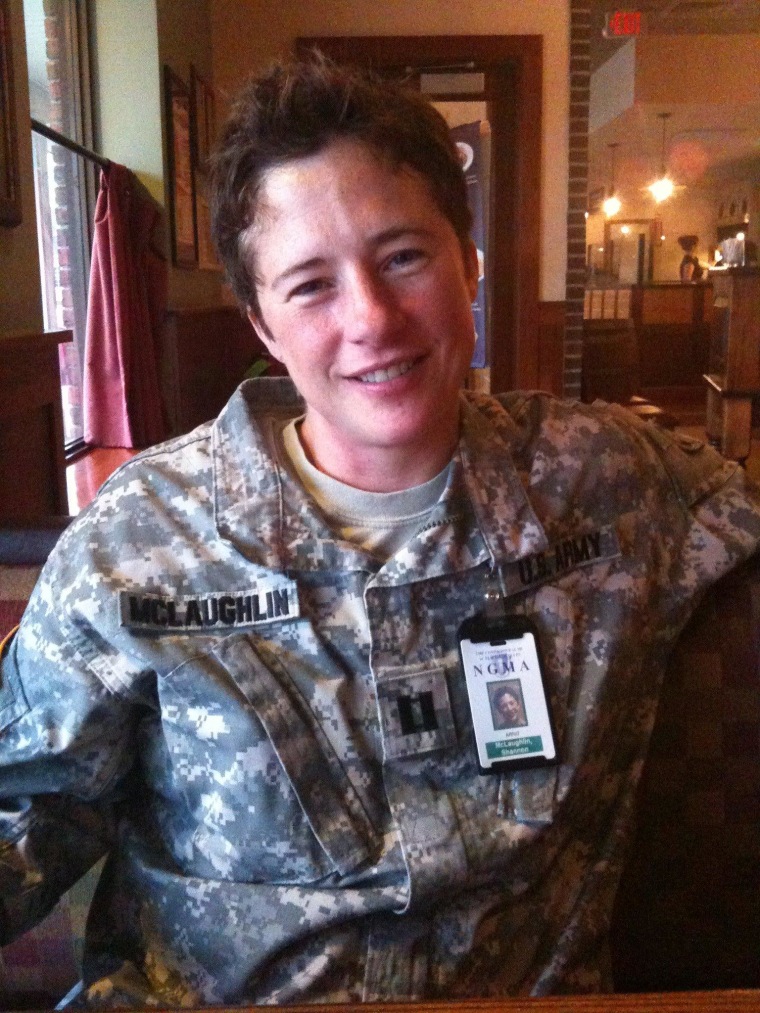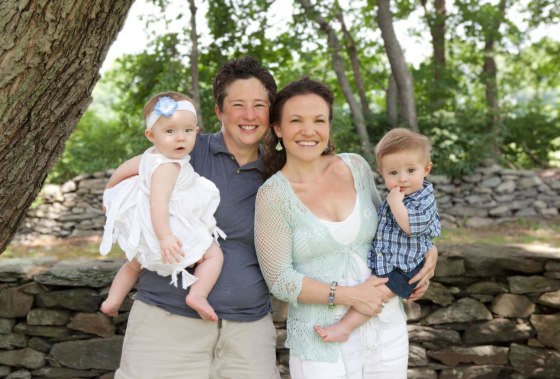On the surface it looks like the American armed forces have executed a stunning reversal on the issue of gay troops in just 21 months — the time spanning the end of 'Don’t Ask Don’t Tell' and the Defense of Marriage Act, struck down Wednesday by the Supreme Court.
And while gay service members and their spouses say military culture has moved toward acceptance and away from whispers, investigations and the shadowy lives they once were forced to lead, they contend that subtle resistance still exists in some command pockets.
In short: The landscape has been outwardly transformed — yet hints of unresolved disquiet still exist, some insiders say.
“This has come a lot quicker than a lot of people expected,” said Stephen Peters, who is married to Marine Corps Maj. Alasdair Mackay. “But there’s still a long way to go as far as building positive, supportive command climates where the service members feel as if it's not just political correctness from leadership — where they actually feel as if being open and honest about themselves and their families is not going to bring repercussions.”
Those hesitations may seem surprising in the wake of the high court's ruling on DOMA, giving same-sex military couples access to more than 1,000 federal benefits once granted only to heterosexual families in the service. And such fears also run counter to the September 2011 repeal of “Don’t Ask Don’t Tell” — the policy that kept gays from openly serving in the branches.
But the uneasy sentiments Peters has heard within the ranks are fueled largely by the fact that the Pentagon’s non-discrimination policy does not protect service members from being treated improperly or unfairly on the basis of their sexual orientation. (Gay civilians who work at the Department of Defense do receive those protections).
“A lot of service members still feel as if they have that fear of coming out because they’re not protected by the policy,” said Peters, executive director of American Military Partner Association, a Washington, D.C.-based support network for lesbian and gay military families.
At some bases, gay service members have reported recent cases of discrimination to their superiors but their complaints were ignored, Peters said.
“I hear stories like all the time. A lot depends upon the command climate that’s been built as far as whether or not the service member feels comfortable going forward and talking about the way they were treated or the comments that were directed toward them,” Peters said. “It can depend where they are serving. In southern California, the command climates are generally more positive and stronger than, say, in North Carolina.”
The DOD's non-discrimination policy must include sexual orientation — along with race, color, religion, gender and national origin — to allow all military families to feel equal, said Army Maj. Shannon McLaughlin, a Judge Advocate General assigned to the Massachusetts National Guard. She is married to Casey McLaughlin and they have two toddler twins.

“If we’re going to be equal, we have to be fully equal, not part-time equal,” said McLaughlin, who was deployed to the Middle East for intelligence duties days after the Sept. 11, 2001 attacks. “It’s not equal in some ways but not in other ways. No. We are equal.”
Nate Christensen, a spokesman for the Pentagon, said Thursday that DOD "prohibits unlawful discrimination based on the sexual orientation of military personnel and civilian employees."
"Allegations of unlawful discrimination based on the sexual orientation of military personnel are handled directly and immediately by the chain of command, so are not processed through the military's equal opportunity program," Christensen said in an email.
In a larger sense, though, times have undoubtedly changed — and perhaps nobody can see that transformation more clearly than McLaughlin. In 2008, military leaders investigated her for being a lesbian. She expected to be discharged from the service on that basis. She doesn’t know who reported her as a gay soldier. She was taken to a room where she saw files of evidence documenting her sexual orientation. In that room, a one-star general questioned her.
“I admitted — and it sounds funny to even use that word — but I admitted I was a lesbian,” said McLaughlin, then a captain. “I had to wait approximately 10 months before the investigation was closed. For some reason, I was retained. I was never told why.”
Three years later, DADT was repealed — a moment McLaughlin describes as “like Christmas.”
“The whole issue with same-same marriage and now with these Supreme Court cases coming to fruition, it feels like it’s happening quickly,” McLaughlin added.
At Fort Bragg, North Carolina, where same-sex Army wife Ashley Broadway was denied membership in late 2012 to the on-base spouses club, the reversal of DOMA has further instilled in her a sense that “this past year, our country proved to be on the positive side of change.”
“For so long, same-sex couples have been treated as if their love did not matter in the eyes of the federal government,” said Broadway, who is married to Lt. Col. Heather Mack and who was named Fort Bragg’s “Spouse of the Year" on Jan. 25. Hours after receiving that honor, the spouses club relented and invited her to become a full member. “Today, the federal government and the U.S. military recognize me for who I have always been, Heather’s wife.”
Further symbolizing the sea change inside the ranks: on Tuesday, the Pentagon held its second LGBT Pride day to honor gay and lesbian service members. The event hosted by Defense Secretary Chuck Hagel.
“Gay and lesbian service members and LGBT civilians are integral to America's armed forces,” Hagel said. “Their ranks include senior leaders, like Acting Secretary of the Air Force Eric Fanning … also Brigadier General Tammy Smith, who last year became the first openly gay general officer in the United States military.
“Our nation has always benefited from the service of gay and lesbian soldiers, sailors, airmen, and coast guardsmen, and Marines,” Hagel said. “Now they can serve openly, with full honor, integrity and respect. This makes our military and our nation stronger.”
But deep inside the military machinery, many gay and lesbian troops and their spouses will continue, they say, their push for absolute parity — socially, culturally and in every policy handbook.
"There is still is, today, very serious work to be done, work that affects military members and their families," McLaughlin said. "They (the Pentagon leaders) have to extend discrimination (protection) to sexual orientation as well, so that we don't have the situation where we’re allowing people to serve, and we’re now treating their families equally, but people can still be discriminated against for that basis only."
